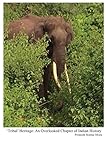'Tribal ' heritage: an overlook chapter of Indian history/ Promode Kumar Misra
Material type: TextPublication details: USA; 2017Description: 542 p. PBISBN: 9780692819289DDC classification: 305.854
TextPublication details: USA; 2017Description: 542 p. PBISBN: 9780692819289DDC classification: 305.854 | Item type | Current library | Call number | Status | Date due | Barcode | Item holds |
|---|---|---|---|---|---|---|
|
|
Central Library, Sikkim University | 305.854 MIS/T (Browse shelf(Opens below)) | Checked out | 19/11/2024 | 45409 |
Tribe as a concept
The word tribe
Tribes in India..
Echo of the similar attitude.
Isolationist and interdependent models
Identity and language situation
Languages of the Scheduled Tribes
Features..
Endnotes.
Chapter 2
Who are the people called tribes in India
Earlier theories
Harappan physical type.
Peopling of India
I
Historian perspective
Tribes in ancient Indian literature...
Endnotes
Chapter 3..
Indian Society and its Ethos.
Food gatherers to food producers
Badaga settlement in Nilgiris..
Bhumij case.
Relational epistemology
Continuity in thought pattern
Tribes embedded in large society.
Complex political history
Autonomy within,
Coercive cooperation
Forest and hills held in reverence.
How larger society reaches to forest dwellers
How forest dwellers deal with larger society...
Endnotes
Chapter 4
Forest and Tribes in India
Forest and human beings
Forest in early India
The story:
Endnotes..
Chapter 5...
Why trijunction
Trijunction part of the Western Ghats
Features of Western Ghats.
Diversity of Nilgiri Biosphere Reserve....
Fluge contradictions
Early history
Social relations
Endnotes
Chapter 6.,
The Situation of the Scheduled Tribes
Larger framework.
The Scheduled Tribes at trijunction
Conceptualizing variation
Zvelebil's findings.
Confusion regarding identity
Three sub-regions,
General features
Habitats.,
Settlements & dwellings.
Purity, pollution and hierarchy:
Gods and goddesses:
Problematic: Kurumba group.,
Endnotes.
Chapter 7
Transformation at Trijunction
Entry of colonial regime
Commercial agriculture..
Area opened up
Demographic.
Urbanization.
Resort industry and tourism
Transport and communication
Development activities and NGOs.
Endnotes.
Chapter 8
Hope and Despair
The survey.
Encounters


There are no comments on this title.